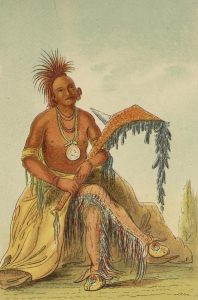The Choctaw Character
The Choctaws were quiet and peaceable among themselves, and no less so in their bearing and inter-course with neighboring tribes. They were ordinarily temperate in their habits, yet on “pay-day ” and other public occasions, they would, if it were possible, procure oko-ho-ma–whisky–and indulge in a “big drunk.” The United States agent and the officers of the tribe were indefatigable in their efforts to prevent the introduction and traffic of intoxicating liquors among them. The contraband article was, however, sometimes smuggled into the country, when its effects were soon visible. We rarely saw one intoxicated during our sojourn in the … Read more

